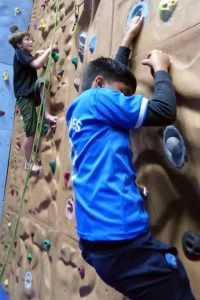
17 Aug Education beyond the classroom
Successful intelligence
According to Robert Sternberg, Dean of Arts and Sciences at Tufts University in the United States, real success in life comes not from test scores and exam results but from what he defines as a synthesis of wisdom, intelligence and creativity – what he calls ‘successful intelligence’. Sternberg experimented with a new admission test called the Kaleidoscope System. This was deliberately designed to identify students’ unique strengths – how they capitalise on them and how they compensate for weaknesses. At the heart of Sternberg’s work is the recognition of the uniqueness of the individual and the diversity of talents which define us.
Most parents instinctively know what research has now convincingly demonstrated – that filling children’s heads full of knowledge in the classroom is not enough to release their individual potential. As the poet WB Yeats put it: “Education is not the filling of a pail but the lighting of a fire.”
So much in education today is like filling a bucket – cramming young heads full of facts and figures or focusing only on the content of a curriculum. We can easily forget that the very word ‘education’ in Greek means to draw something out, not to put something in.
"We believe that a focus on academic subjects alone does not do justice to human potential – nor the mounting evidence from psychology, biology, neuroscience and educational research."
This is why we have a broad approach to the curriculum at Woodstock and that is why our education goes beyond the walls of our classrooms. We believe that a focus on academic subjects alone does not do justice to human potential – nor the mounting evidence from psychology, biology, neuroscience and educational research.
Enhancing the educational experience
This approach includes all those things which are deliberately intended to enhance the educational experience here. It encompasses everything from the academic curriculum to music, drama, outdoor education, technology, community engagement, opportunities for performance, sports and the residential and spiritual life of the community. In combination, these various components represent the unique contribution we can make to the shape and direction of a young person’s life.
"Enriching experiences can be a powerful means of exploring and enhancing an academic program – and so, too, can the academic program enliven and enrich the value of these experiences."
We do not see enrichment as something which is, by definition, extra-curricular. Enriching experiences can be a powerful means of exploring and enhancing an academic program – and so, too, can the academic program enliven and enrich the value of these experiences. These must not be seen as competing components vying for territory in an on-going tussle over time and resources. They are different aspects of an approach which values the balanced development of the whole person. This approach recognizes that we never really knowing from which of life’s rich varieties of experiences a young person might find their passion and purpose. For some it might come from the intellectual life. For others it might come from formative experiences outside of the classroom or the text-book.
Education is most powerful when it sees significance beyond the academic curriculum, the grade-book and the examination hall. It is about shaping young lives, confronting the destructive modern patterns of materialism and self-centeredness and showing young people how to live what the ancient philosophers called the ‘good life’. C.K. Chesterton was right when he said that the most important fact about the subject of education is that there is no such thing: “Education is not a subject, and it does not deal in subjects. It is instead the transfer of a way of life.”
Dr Jonathan Long, Principal






Shivani singh
Posted at 14:12h, 02 JanuaryI totally agree with your point of view regarding the education beyond learning. Education should be more than sitting in the class and cramming questions and answers, Who would not like to send their children in your kind of school ?but not everybody could afford the feeling,it’s very high
DR IT Group
Posted at 15:40h, 27 OctoberI believe that focus on education is not only the purpose of growing up in life. We learned a lot of things outside the classroom. The various contribution can make to the shape and it gives the best direction to the young person’s life.